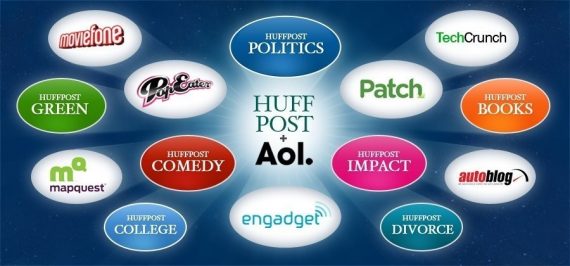Huffington Post Freelancer Files Class Action Suit Against HuffPo
A Huffington Post contributor who had no expectation of being paid for his contributions is suing HuffPo for $105 million.
One of the many thousands of writers who provided free content for the Huffington Post over the years has filed a multi-million dollars class action lawsuit against the company, alleging, somewhat absurdly, that he was treated like a slave:
The Huffington Post is the target of a multimillion dollar lawsuit filed in United States District Court in New York on Tuesday on behalf of thousands of uncompensated bloggers.
The suit seeks at least $105 million in damages for more than 9,000 writers.
The case raises significant unsettled questions about the rights of writers in the digital age and, at the very least, promises to offer a palette of colorful characters on each side.
The legal battle is being led by Jonathan Tasini, a labor advocate who was the lead plaintiff in a pivotal freelancers’ rights ruling in 2001. On Tuesday, Mr. Tasini unleashed his outrage over The Huffington Post’s practices, likening the Web site’s founder, Arianna Huffington, to a slave owner.
“The Huffington bloggers have essentially been turned into modern-day slaves on Arianna Huffington’s plantation,” Mr. Tasini said in a conference call with reporters. He vowed to picket Ms. Huffington’s house and turn her into an outcast in the liberal circles where she made her blog so prominent.
“It’s very important to understand the hypocrisy here,” he continued. “We are going to make Arianna Huffington a pariah in the progressive community.”
He concluded the call by addressing Ms. Huffington directly. “Until you do justice here, your life is going to be a living hell.”
Like the other freelance HuffPo writers, of course, Tasini had no express or implied agreement with the website’s owners that he would be compensated in any way for their contributions. So, his attorney is proceeding under a common law theory of recovery known as unjust enrichment:
Jesse Strauss, an attorney for the plaintiffs, said the suit is based on a claim of unjust enrichment. “The legal theory we’re going on is one based in common law,” he said. “This is not a statutory claim….This is not a contract claim.”
In other words, the fact that the vast majority of Huffington Post’s 9,000 bloggers signed on without any expectation of direct monetary gain is irrelevant to this claim. “Rather, it’s the value contributed to the Huffington Post, which is very much amenable to class treatment,” says Strauss.
That value, in the plaintiffs’ reckoning, is $105 million, or one-third of the price AOL paid to acquire Huffpo.
Before addressing the legal merits of this claim, it seems pretty clear that Tasini has a serious factual problem in terms of the amount of damages being claimed, because it’s clear that freelance bloggers such as himself were responsible for only a very small portion of The Huffington Post’s traffic:
The Huffington Post had revenues of about $30 million last year, they’ve reported, almost all of which was from display advertising. This revenue was generated on roughly 4.8 billion page views over the course of 2010, according to Quantcast data. That means the average page view was worth a little more than six-tenths of a cent, or that 1,000 page views were worth about $6.25. Do the multiplication, and you find that the average blog post — which we estimate generated a couple thousand page views — was worth about $13 in advertising revenue. The median blog post, with several hundred views, was worth only $3 or $4.
The idea that these unpaid writers were responsible for one-third of the site traffic, and therefore are entitled to share one-third of the price that AOL paid when it acquired the site is, quite simply, absurd. As Eugene Volokh points out, there is simply no legal merit to the claims asserted in the lawsuit:
I think Tasini’s claim is a loser. He has entered into a well-understood deal: He provides content, and is paid in eyeballs rather than dollars. Lots of people have taken time and effort to try to reach a much smaller audience (say, on a street corner), with no prospect of payment. Tasini was given a great opportunity to spread his ideas to a considerably larger potential audience, and he took advantage of it, presumably because spreading the ideas was compensation enough to entice him. It sounds like Tasini is trying to revise the terms of the deal into which he entered, but I’m pretty sure that the law won’t let him do that.
It’s true that modern law has departed in many ways from freedom of contract; in particular, ostensible volunteers have in some situations been found to be employees, governed by the Fair Labor Standards Act. One prominent case involved AOL, which recently bought the Huffington Post; AOL was found to potentially be an employer with regard to ostensibly volunteer discussion group moderators, but this was partly based on AOL’s apparent suggestions that if a person “volunteered” enough he “would be considered for a paid position.” Moreover, as the court pointed out in that case, another important factor is whether the volunteer “derives a ‘substantial advantage’ from the work performed”: “While Plaintiffs may have also enjoyed their participation in some of their activities for AOL, not all of the work performed was of such a nature. For example, administrative work, such as writing reports to AOL supervisors, was not the type of work a reasonable fact finder would necessarily find to have been performed for the Plaintiffs’ benefit.” (Hallissey v. Am. Online, Inc., No.99-CIV-3785, 2006 U.S. Dist. LEXIS 12964 (S.D.N.Y. Mar. 20, 2006).) It seems to me that the opportunity to reach a large audience for one’s ideas — with no real administrative work — would indeed be a substantial advantage that the authors received. (It’s true that Tasini’s Complaint asserts that it’s not clear he was getting that audience, but he was obviously getting enough that he was willing to keep writing.)
I checked with my colleagues Prof. Katherine Stone and Prof. Noah Zatz, and they agreed with me that Tasini can’t prevail under this theory. (Prof. Zatz also adds that the remedy for an FLSA violation — not that there was one here — would just be the unpaid minimum wages plus some penalties, and not the share of the profits that Tasini is asking for.) Employment law may set aside or revise some deals, but not all deals, and not this deal. So I think that Tasini’s lawsuit is essentially just political grandstanding. Perhaps he’ll win the publicity battle, if he can convince the Huffington Post audience that the Post is somehow acting unfairly. But I don’t think he has a viable legal claim, nor do I agree with any moral claim that he might have.
Freelancers such as Tasini entered into their relationship with HuffPo with their eyes open. They knew that they weren’t going to receive compensation for their work and they had no reasonable expectation that they were going to share in the ad revenues that their posts might have generated. They submitted material anyway, however, whether it was for exposure, eyeballs, recognition, or even merely their own enjoyment. To come back several years later and claim that they deserve to be paid for something they had no expectation of payment for merely because Arianna Huffington hit the big time with the AOL buyout is. quite simply, absurd. As Professor Volokh points out, there are plenty of instances in our world were people share their content without compensation:
I’m also ruthlessly enslaved by radio and television programs that ask me to appear on them, and that indirectly make money from my priceless punditry without paying me a penny. And of course I run a veritable forced labor camp here, where the authors of our million comments are (doubtless to their shock and horror) entirely unpaid, even though they drive up our page views and thus our income stream.
And remember: Every comment you write in response to this post is just further oppression of you. Have you no self-respect?
Indeed. These freelancers are, in my opinion, no different than an individual who blogs on his own site without generating any real revenue. There are any number of dozens of reasons that they do it that don’t involve making money. The idea that either one of them is a “slave” is silly beyond words.
Here’s a copy of the Complaint:






Nicely covered, Doug. But you may have missed their main goal: a settlement. It really hardly matters what merits there are to the case.
As a regular commenter here I demand a piece of the millions Joyner rakes in daily from OTB.
Yes this is true. I imagine HuffPo will try to get this case knocked out on an early motion or two and if that doesn’t work, they’ll settle simply because it’s cheaper. It’s sad that people can use litigation like that, but it ends up being a pure business decision and its cheaper to settle than litigate most of the time
If you do something well, don’t give it away for free. If you do, don’t expect anything in return later.
@mantis: They didn’t ‘give it away for free.’ They did it in the hope and expectation of having their bylines seen by many, met with the approval of many, and–just maybe–offered a big-time, high-paying job. They got a platform in return for their content as contributors. As commenters, they neither deserve nor are owed any compensation beyond the electrons expended to display their mighty wisdom.
Why spend so much time on this? It seems awfully open and shut, unless your a progressive whose definition of fairness is endlessly flexible, retoractive, and allows you to forever keep reaching back into the well.
@mantis: They didn’t ‘give it away for free.’ They did it in the hope and expectation of having their bylines seen by many, met with the approval of many, and–just maybe–offered a big-time, high-paying job.
I was referring to money, not these more ethereal, intangible forms of compensation. Professional writers get paid for their writing. Amateurs do it for exposure or personal pleasure. Amateurs shouldn’t expect monetary compensation, especially after the fact.
So why isn’t the fact that Arianna profited, via capitalism, from this little enterprise making her a pariah? And why wouldn’t their pursuit of the almighty dollar also make them a pariah?
The lawyers for this class need to start another for current & former Huff employees. The bored Hollywood housewives that run the Huff are violating all kinds of US labor and payroll tax laws. All you reporters out there looking for an epic expose story, there is one to be written. Wouldn’t take much digging to uncover. For starters, send in some state and federal labor law auditors to interview past & present employees.
Hear hear!!!!!!!!But I am willing to settle for like a pack smokes per ramble:) Newport! I don’t want any of that artsy incense tasting crap or any of them non menthol tree barks!!!
G.A.:
You and me, brother, let’s file a class action. Pack of smokes and a stogie.
I have little to no sympathy for these folks. They volunteered, wrote at their leisure, and posted at their leisure. End of story.
Now, if they could show that they were given regular assignments and deadlines and faced some form of discipline or sanctions if they didn’t meet them … well that would be a different story. And that’s not the story being told here.